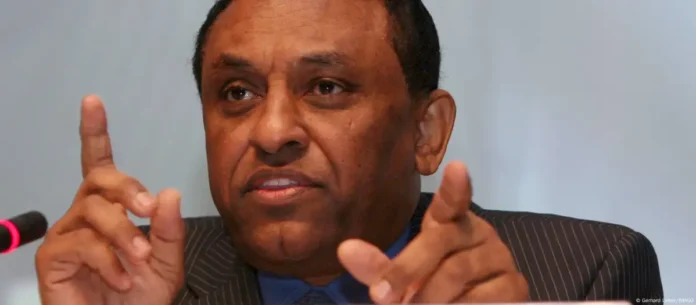Khartoum – The Chairman of Sudan’s Sovereign Council and Commander-in-Chief of the Armed Forces, Abdel Fattah al-Burhan, issued a constitutional decree on Monday appointing two women as members of the Sovereign Council and Kamil Idris as Prime Minister with full powers, after more than four years during which the position was managed on an interim basis.
According to the decree, Dr. Salma Abdel Jabbar al-Mubarak and Dr. Nawara Abu Mohamed Tahir were appointed as members of the Sovereign Council, representing the Central and Eastern regions. The General Secretariat of the Sovereign Council and relevant state bodies were directed to implement the decree.
A subsequent decree appointed Dr. Kamil El-Tayib Idris Abdel Hafiz as Prime Minister. Another decision annulled the previous directive assigning Sovereign Council members to supervise federal ministries and units, instructing all relevant parties to implement the new decision.
Following the October 2021 military coup, which ousted civilian members of the Sovereign Council and the government of then-Prime Minister Abdalla Hamdok, Burhan appointed new civilian members to the Sovereign Council and assigned Minister of the Cabinet Osman Hussein to act as Prime Minister, with ministry directors serving as acting ministers until a new government was announced. Later, Burhan dismissed all civilian members, retaining only military members and representatives of the Juba Peace Agreement signatories.
Among those dismissed was Salma Abdel Jabbar, who has now been reappointed as a member representing the Central region. She hails from Gezira State, holds a PhD in Environmental Sciences, and is a member of both the Sudanese Islamic Jurisprudence Complex and the Board of Trustees of the Ibad al-Rahman Islamic Complex.
The second female appointee, Nawara Abu Mohamed, studied development and guidance at Ahfad University for Women, earning a master’s degree in sustainable rural development and a bachelor’s degree in development and guidance. She has held prominent positions in academic institutions and several local and international organizations, including Médecins Sans Frontières, Oxfam, and the National Masar Organization, and is an expert in organizational management, peace studies, and conflict resolution.
After over four years of interim management, Burhan’s appointment of Dr. Kamil Idris as Prime Minister with full powers follows the recent appointment of diplomat Dafallah al-Haj as acting Prime Minister. Idris is a prominent politician, diplomat, and academic, and a former presidential candidate who ran against former President Omar al-Bashir in 2010. Born in the village of Al-Zourat in northern Sudan, he holds a bachelor’s in philosophy from Cairo University, a law degree from the University of Khartoum, and a PhD in international law from the Graduate Institute of International and Development Studies in Geneva. Idris served as Director General of the World Intellectual Property Organization (WIPO) for ten years and as Secretary-General of the International Union for the Protection of New Varieties of Plants (UPOV), and has lectured at several universities.
Following the Sudanese revolution in December 2018 and the ousting of Bashir in April 2019, Idris was among the candidates considered for the premiership of the transitional government, a position ultimately filled by Abdalla Hamdok. Sources indicate that Idris’s appointment was contingent on being granted full authority to form and manage the upcoming government.
It is expected that Idris will soon announce the dismissal of the interim government and the formation of a new cabinet. Parties to the Juba Peace Agreement are expected to retain their ministerial quotas, though it remains unclear whether they will keep the same ministries.
Burhan also ended the practice of Sovereign Council members managing ministries, a system that had led to conflicts and the dismissal of some acting ministers.
Additional civilian members are expected to be appointed to the Sovereign Council, which currently consists of four military members and three representatives of the Juba Peace Agreement signatories. The council is expected to expand to 11 members after the new appointments. Burhan had previously dismissed two leaders of armed movements from the council after they sided with the Rapid Support Forces (RSF), replacing them with leaders of splinter groups.
These constitutional changes and preparations for a new government coincide with statements from RSF leaders about forming a parallel government. Despite the army’s control of about 70% of the country, the RSF continues efforts to establish its own administration and has discussed plans for a new currency and identity documents.
Meanwhile, the army spokesperson denied allegations that the military killed civilians in the village of Al-Hamadi in South Kordofan, calling them “false claims” and accusing the RSF and its political allies of spreading misinformation. The Emergency Lawyers’ Committee had accused the army of killing 18 civilians, including women and children, and of carrying out looting and arbitrary arrests, which led to the displacement of dozens of civilians under harsh humanitarian conditions. The committee stated that Al-Hamadi was free of military presence at the time of the attack, which followed clashes in the nearby area of Al-Shushaya.
After the attack, the army reportedly stationed itself in the village, imposed restrictions on civilians, and seized the only means of communication, increasing the isolation and hardship of the residents.


